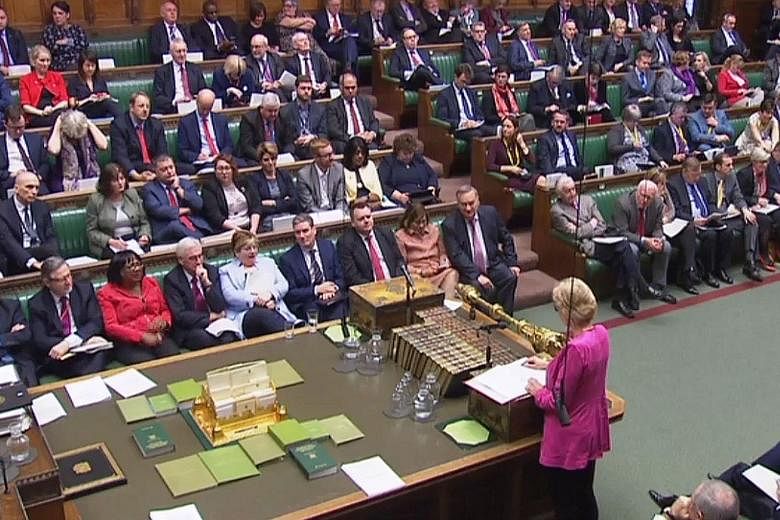LONDON • The European Union's top legal adviser has said Britain had the right to withdraw its Brexit notice, opening a new front in a battle over Prime Minister Theresa May's plans to leave the EU as her government faces accusations of contempt of Parliament.
The advice from the European Court of Justice's (ECJ) advocate general yesterday emboldened supporters of EU membership in Britain's Parliament on the first of five days of debate on Mrs May's plans to keep close economic ties after leaving the bloc in March, Reuters reported.
Mrs May faces a daunting struggle to secure Parliament's approval in the key vote on Tuesday, after her plan was criticised by Brexit supporters and opponents alike.
"The British people want us to get on with a deal that honours the referendum and allows us to come together again as a country, whichever way we voted," she would tell lawmakers yesterday, according to excerpts of her speech. "This is the deal that delivers for the British people."
Mrs May has long warned lawmakers that if they do not back her deal, they could open the door to Britain falling out of the EU without any measures to soften the transition, or that Brexit might not happen.
The advice from the ECJ advocate general, not binding but usually heeded by the court, suggested to some lawmakers that revoking Britain's "Article 50" divorce notice was an option.
-
What's in store for PM May
-
IF SHE WINS
If British Prime Minister Theresa May wins parliamentary backing for her Brexit plan in a vote due on Dec 11, Britain will leave the European Union on March 29 under terms negotiated with Brussels. It will be Britain's biggest shift in trade and foreign policy for more than 40 years.
IF SHE LOSES
Mrs May could call for a second vote on the deal but a defeat would increase the chances of Britain leaving without a deal - a prospect that could mean chaos for Britain's economy and businesses - and put Mrs May under fierce pressure to resign. It could also make it more likely that Britain holds a second referendum on Brexit, three years after voting narrowly to leave the EU, or lead to Brexit not happening.
Meanwhile, opposition parties and Mrs May's own nominal allies in the Northern Irish Democratic Unionist Party were pressing yesterday for her government to be found in contempt of Parliament for failing to publish in full the legal advice on Brexit that it commissioned, Reuters reported.
They condemned ministers for providing only an outline of the legal basis for the Brexit deal after Parliament voted last month to force the government to make public the full advice.
They put forward a motion which, if passed following a debate later yesterday, would find ministers in contempt of Parliament and order the immediate publication of the advice.
"The government is wilfully refusing to comply with a binding order of this House and that is contempt," Mr Keir Starmer, the opposition Labour Party's Brexit spokesman, told Parliament at the start of the debate.
"This motion is a last resort."
The sanctions ultimately available include suspending a lawmaker, most likely Attorney-General Geoffrey Cox.
This would be unprecedented, with such punishment usually reserved for backbench lawmakers guilty of individual wrongdoing, including financial misconduct. In reality, the vote is about putting pressure on an already weakened government, Reuters reported.
"Symbolically, it would be very significant. Parliamentarians do take the sovereignty and privileges of Parliament very seriously, it would not be a hollow strike against the government for them to be reprimanded in this way," said Dr Catherine Haddon, senior fellow at the Institute for Government.
Mrs May, 62, has toured Britain, spent hours being grilled in Parliament and invited lawmakers to her Downing Street residence to try to win over her many critics.
But the deal has united critics at both ends of the political spectrum: Eurosceptics say it will make Britain a vassal state while EU supporters take a similar line, saying it will have to obey the rules of membership while forgoing the benefits.
More than two years after Britain voted to leave, the testy debates that shaped the referendum have intensified, dividing Britain and unsettling markets, businesses and foreign residents.
Mrs May hopes that if she forces her deal through Parliament, firms that have put off investments and made contingency plans for fear of trade drying up will be able to move forward again. She said her Brexit deal will maintain close economic ties with the EU, while enabling Britain to trade more freely with the rest of the world.












